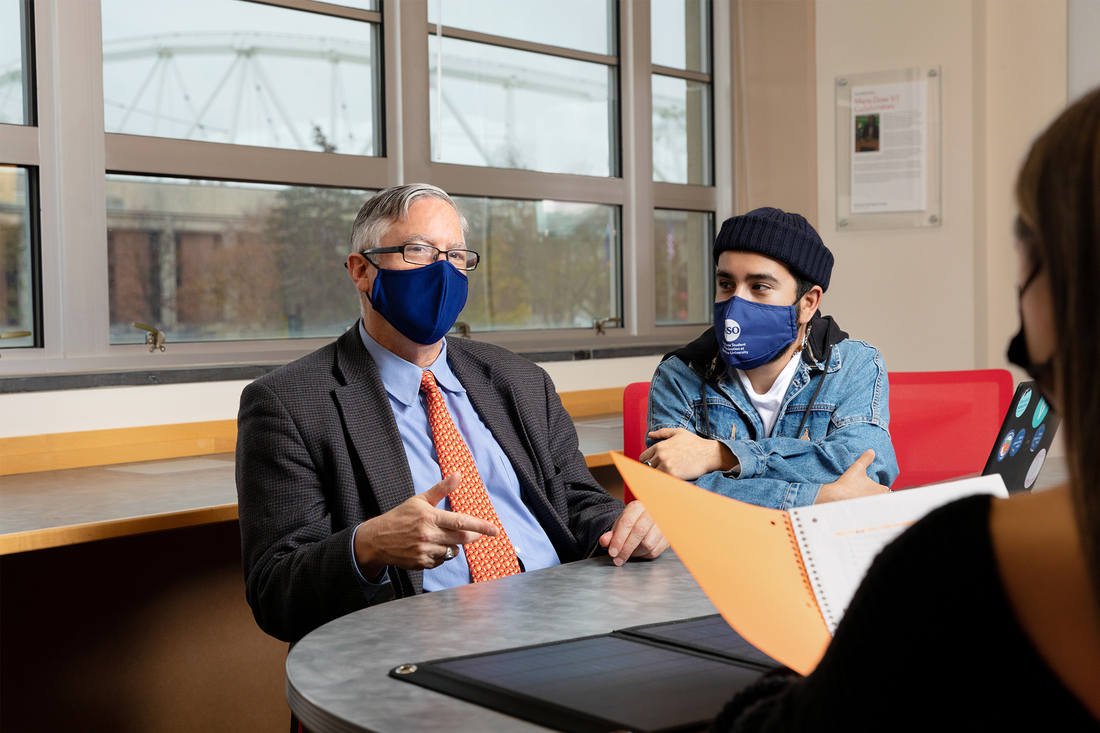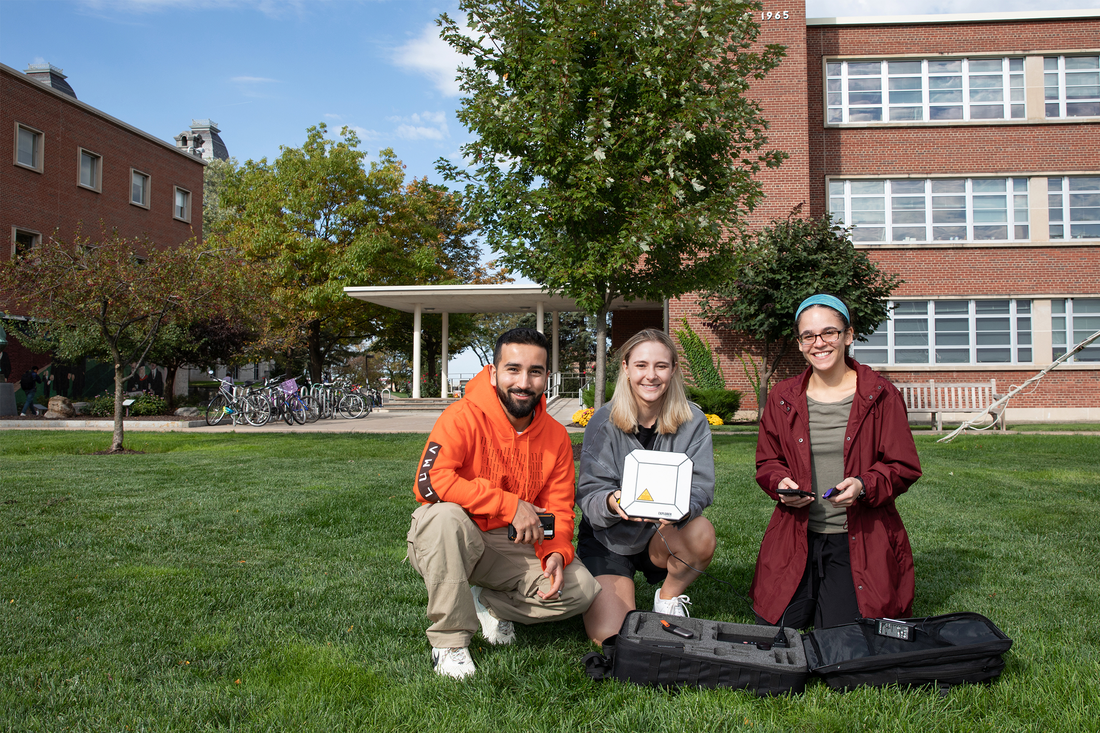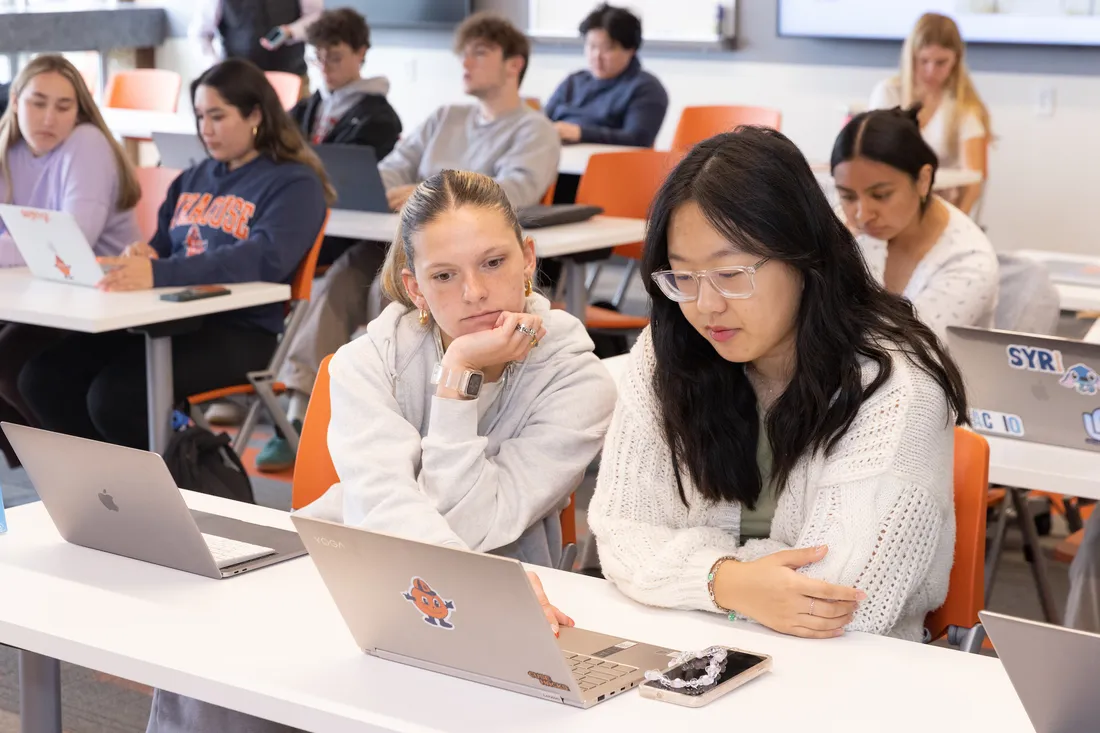
Associate Professor Lee McKnight (left) teaches Blockchain Management, a first-of-its-kind course that has helped propel the School of Information Studies to the forefront of the field.
“When there’s a supply-chain disaster, every moment counts,” says Lee McKnight, an associate professor in Syracuse University’s School of Information Studies (iSchool). Walmart found this out in 2011, when it was forced to close some stores in China for selling mislabeled pork. The retailing juggernaut eventually partnered with IBM’s enterprise blockchain services to create Food Trust, a traceability network that works in a matter of seconds. “Food traceability used to take hours or days,” McKnight notes. “Walmart’s system can save lives and protect the livelihood of its suppliers by pinpointing when and where compromised food is packaged, delivered and sold.”
Central to Walmart’s approach is blockchain—a highly secure network that publicly records transactions and tracks assets. While blockchain utilizes internet technology, it does not rely on centralized servers and intermediaries like banks and government agencies. (After all, servers can be slow, unreliable or susceptible to hacking.) Instead, blockchain functions like a large, encrypted ledger, where almost anything of value—from cars and cash to copyrights and patents—can be tracked and traded on the global stage.
“When a transaction is recorded, it’s posted across millions of computers,” explains McKnight, a nationally renowned author and inventor specializing in technological innovation. “People called miners, with massive computing power at their fingertips, assemble these transactions into blocks. When the transactions are validated, or verified, one of the miners might be rewarded with digital currency for their effort.”
A blockchain has the added benefit of being immutable, or incapable of being changed. For this reason, blockchain networks don’t just promote sound business practices; they also seek to gain the trust of users. “Blockchain is where the internet was 15-20 years ago,” McKnight says. “There’s a lot to be worked out, but the rewards outweigh the risks.”
Blockchain isn’t the answer to everything, but there are many problems for which it’s part of the best solution. Our students will power the future of this exciting technology.
Professor Lee McKnight
Blockchain: A decentralized system that records transactions in a distributed ledger.Cryptocurrency (aka crypto): A digital currency characterized by secure information and communication techniques. There are thousands of cryptocurrencies, of which bitcoin is the most popular.Crypto mining: A process by which some cryptocurrency transactions are verified and added to a blockchain.Decentralized Finance (DeFi): A financial system devoid of traditional intermediaries, like banks, brokerages and exchanges.Immutability: The ability of a blockchain ledger to remain unchanged and unaltered.Internet of Things: Web-enabled smart devices, like appliances, that communicate and share data over wireless networks and cloud services.Non-Fungible Token (NFT): A digital representation of an object, like music, art or video, that is bought and sold on a blockchain.Smart Contract: A blockchain program that automatically executes an action or event when predetermined conditions are met.
Earning Digital Bragging Rights
McKnight unveiled the world’s first blockchain management course in 2017, when the technology went mainstream. His aptly titled course, Blockchain Management (IST 408/608), has since catapulted the iSchool to the forefront of blockchain teaching and research. The first half of IST 408/608 is devoted to labs, lectures and readings. The second half, inspired by the TV reality show Shark Tank, requires students to pitch original business ideas to a panel of guest judges. “By the end of the semester, everyone knows how to write a smart contract,” says McKnight, referring to code that carries out instructions on a blockchain. “It’s hands-on learning at its best.”
Professor McKnight has altered the trajectory of my academic and professional career. Soon after we connected, he got me involved with projects that advanced my understanding of blockchain development.
Catherine Forrest ’22
McKnight considers his course a response to the rising popularity of—and ensuing confusion over—blockchain. “The super-geeky term ‘NFT’ [non-fungible token] is widely understood by musicians, artists and sports stars,” he says, noting that NFTs can include digital representations of actual objects, like pieces of art, that are embedded within a smart contract and added to a blockchain. “Other terms like ‘bitcoin’ and ‘crypto’ are used so interchangeably that even people who speculate or invest in them don’t fully understand what they’re talking about.”
Bitcoin is a leading example of blockchain technology. Devoid of government oversight and processing fees, this type of digital currency is de rigueur among individuals and companies. “Bitcoin operates on the premise of limited supply,” says McKnight, adding that about 80% of the world’s 21 million bitcoins are in circulation. "Artificial scarcity makes bitcoin inflation-resistant as well as able to hold its value for a long time."
Turning Passion into Possibility
This past summer, McKnight organized a three-day blockchain and cryptocurrency research workshop for members of academia, government and industry. One of the presenters was the United Nations’ Betania Allo LL.M. ’20. Along with Facebook executive Yusuf Abdul-Qadir ’11, G’20, she discussed how blockchain disrupts highly regulated or structured financial systems. “Blockchain allows anyone in the world to register a transaction with a securely guaranteed timestamp,” says Allo, who earned a Master of Laws degree from the College of Law. “Blockchain breaks with everything we’ve practiced in the past 200 years in finance, education, law, health care and government. Because no one intermediates for anyone else, this platform reduces costs while improving efficiency, transparency, productivity and inclusiveness.”
Blockchain breaks with everything we’ve practiced in the past 200 years in finance, education, law, health care and government.
Betania Allo LL.M. ’20
Allo has spent the past decade following bitcoin, which has sparked a cryptocurrency revolution in her native Argentina. A recent survey finds that more than 70% of Argentinians consider bitcoin an effective medium of exchange. “In a country ravaged by recession and COVID-19, crypto can’t be inflated by political decisions,” she says. “The digital interface also makes bitcoin easier and safer to use than traditional currency.”
McKnight’s course served as an inflection point in Allo’s career. “His hands-on, entrepreneurial approach exceeded my expectations.” So did her classmates, who were almost exclusively data and computer scientists. “I was probably the only one there from a non-computer science background,” says Allo, who has since become one of McKnight’s guest judges.
IST 608 also gave rise to Takapool, a decentralized finance (DeFi) crowdfunding service that helps Muslim communities in need. Co-developed by Allo and Abdul-Qadir, the application utilizes a blockchain network called Ethereum, where participants can store and transfer sensitive personal data, like insurance claims. “Blockchain automates the underwriting and claims settlement process,” she says. “This tool will eliminate fraud and third-party interference while increasing the efficiency of property and casualty insurance among Muslim clients.”

Catherine Forrest ’22, an information management and technology major, is flanked by Abdullah Naimzadeh G’22 and Eva Colon G’21, whose interests include cloud management and data analytics for public policy, respectively.
Tackling Real-World Problems
As a kid, Zachary Goldstein ’22 was obsessed with problem solving—specifically, breaking things and putting them back together. He parlayed this enthusiasm into an information management and technology major in the iSchool. A knack for cybersecurity has led to several high-profile internships, including one at the blockchain tech startup SIMBA Chain, and his vice presidency of Worldwide Innovation Technology (WiTec) and CryptoCuse, campus organizations that provide experiential learning and research opportunities in the blockchain, NFT, DeFi and cryptocurrency industries.
Whereas WiTec partners with outside organizations to teach students about policy, standards and business engagements, CryptoCuse focuses on cryptocurrency and the technology associated with it—an effort underscored by the club’s affiliation with the Blackstone LaunchPad at Syracuse University Libraries. “We have everything we need to turn ideas into real business,” says Goldstein, adding that one of the world’s largest bitcoin mining firms, Coinmint, is three hours from campus. “As an extension of Professor McKnight’s Blockchain Management course, CryptoCuse enables us to research and learn about different cryptocurrencies. We’re on the ground floor of something big.”
Likewise, Catherine Forrest ’22 is an information management and technology major. She also is a trailblazer. Committed to injecting much-needed diversity into the tech industry, she is president of both WiTec and CryptoCuse, the latter of which she co-founded with Goldstein. “Diversity and inclusion are important components of any organization,” says Forrest, who usually is the only woman at campus blockchain meetings. “No matter who you are or where you’re from, you have a place at CryptoCuse and WiTec.
As an extension of Professor McKnight’s Blockchain Management course, CryptoCuse enables us to research and learn about different cryptocurrencies. We’re on the ground floor of something big.
Zachary Goldstein ’22
An intrepid researcher with grants to show for it, Forrest is pursuing original scholarship with support from the Syracuse Office of Undergraduate Research and Creative Engagement. Her goal is to create an exact copy, or digital twin, of a method used to track the transmission of COVID-19 and its emerging variants in real time. While popular, digital twin technology can be risky, explains Forrest, whose research is supervised by McKnight. “We want to blockchain the digital twin so that we can solve its inherent access-control security issues," she says.
Forrest also is a student research assistant on a project led by Danielle Taana Smith, professor of African American studies and director of the Renée Crown University Honors Program, both in the College of Arts and Sciences. Funded by the Internet Society Foundation, the project uses so-called Internet Backpacks to connect people in remote areas of Costa Rica. Forrest says that the self-contained backpacks—co-invented by McKnight with Imcon International, in which he has significant equity interest—will be set up in public spaces to provide essential healthcare information and data, particularly regarding the spread of COVID-19.
As McKnight’s mentee, Forrest played a key role in the development of his recent research workshop, co-chairing the Student Organizing Committee. The only undergraduate to present original research, she also facilitated a discussion about blockchaining the Internet of Things—a system of internet-connected objects that communicate over wireless networks—with executives from VMware, Helium and Imcon. Forrest rounded out her workshop experience by unveiling EdguCoin, a blockchain-based education platform that she co-developed with Goldstein and has been the subject of multiple investment offers.
Forrest credits McKnight for propelling her to unprecedented heights. “Professor McKnight has altered the trajectory of my academic and professional career,” she says, adding that McKnight first recognized her potential during IST 408/608. “Soon after we connected, he got me involved with projects that advanced my understanding of blockchain development. He saw something in me that I didn’t see in myself.” Under McKnight’s watchful eye, she hopes to ultimately use blockchain technology to make cyberspace a “safer place” for all users.
Mining the Future
Blockchain’s future looks bright, especially at Syracuse, where McKnight is exploring other blockchain offerings on campus, following the iSchool’s recent addition of several certificates of advanced study, including one in cloud management.
Meanwhile, blockchain is redefining the teaching and study of supply chain management. “It represents the next generation of the internet and has the power to disrupt so many areas—health care, business, the government, even higher ed,” McKnight says. Blockchain’s potential applications are ostensibly far-reaching—from managing fractional ownership in self-driving cars, to sharing encrypted health information with multiple providers, to changing the way funds are transferred between clients. “Blockchain isn’t the answer to everything, but there are many problems for which it’s part of the best solution. Our students will power the future of this exciting technology.”


